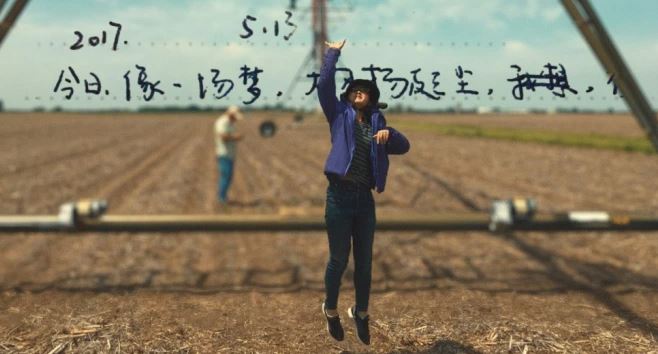By Jana Monji, AsAmNews Arts & Culture Reporter
Finding Yingying is a tragic true-life tale of two women, both from China on an adventure in Illinois in 2017. Director Jiayan Jenny Shi was enrolled in a one-year journalism program at Northwestern. About three hours away, at the University of Illinois at Urbana-Champaign (UIUC), another Chinese woman, Yingying Zhang had arrived for her American adventure in late April never to return to China. Through Zhang, Shi found her voice as a journalist and documentarian and her first feature film, Finding Yingying, has garnered her awards.
Shi had just graduated from Peking University with a BA in broadcast journalism in 2016. The year before, she had spent the summer at the University of British Columbia, Canada. Entering a graduate journalism program in Chicago, Shi was still in classes in early June of 2017.
Zhang received her BS from Sun Yat-Sen University (Guangdong, China) in environmental science in 2013, ranking second in her class behind her fiancé, Xiaolin Hou. Hou and Zhang both attended graduate school at Peking University with Zhang graduating in 2016. (Hou received his PhD in 2019).
Zhang traveled to Illinois in late April 2017. According to the trial transcripts, Professor Kaiyu Zhang had provided Zhang with the opportunity to come as a visiting scholar to research photosynthesis in soybeans and corn. Her plans were to marry Hou in October and to enter a doctoral program at UIUC. On June 9, 2017, hoping to save money, Zhang wanted to change her living situation. On her way to meet with an apartment manager, Zhang disappeared.
Shi was one of the many volunteers who helped with the search for Zhang and when Zhang’s father, younger brother and fiancé arrived, Shi helped translate and otherwise facilitate their stay and search. In a recent phone interview, Shi recalled, “I was in a documentary journalism class. I had never done any sort of storytelling.”
As the search continued, Shi said, “I had a lot of ethical questions: whether we should film the family when they were engulfed in grief.” Shi worried if “filming them was a way to exploit my relationship with them” and felt, “as a journalist I don’t really try to interfere with what’s going on.” Still, she recalled, “I got really close to the family” and it was hard to separate herself from the story. “I ended up being one of the components of the story.” Shi learned “There’s a way to apply personal experience to documentary journalism.”
Because her involvement began while she was still a student, Shi was able to discuss these issued with her professor, Brent E. Huffman, who would eventually become one of the film’s producers. Later, Gordon Quinn, co-founder of Kartemquin Films came on board as executive producer and told her that “because I was aware of the (ethical) issues, I was asking the right questions at the very beginning.” Shi noted that Finding Yingying isn’t a traditional crime story. In shaping the story, Shi recalled, “At first we had used images of the crime scene,” but it was too much. “It felt like were were glorifying the perpetrator. We didn’t want to highlight the crime.” There are short segments of the trial because “we want the audience to understand exactly what happened, how hard Yingying fought during the last moments of her life.”
Because Shi felt it’s “crucial to learn from other great filmmakers and their work” one of the films she was influenced by was the 2009 Last Train Home (归途列车). For several years, director Lixin Fan traveled with one couple, Yang Zhang and Changhua Zhang (no relation to Yingying Zhang), as they returned to their rural home village to celebrate New Year’s. With 130 million migrant workers going home once a year, it’s the world’s largest human migration. The film won Best Feature Documentary at the 22nd International Documentary Film Festival Amsterdam and a Golden Gate Award in the Investigative Documentary Category at the San Francisco International Film Festival.
Shi found Fan’s artistic approach appealing in how it “explores cinema verité style.” In her documentary, “one of the goals is to put the audience in the shoes of the family so they can really go through the journey with Yingying’s parents.” She wanted to “create a sense of observation.”
For the criminal trial of Zhang’s killer, former UIUC physics grad student Brendt Allen Christensen, Shi liked how John Farbrother edited the 2016 Steve James’ documentary Abacus: Small Enough to Jail. “That’s one of the reasons we wanted to bring him on board,” she explained. The Oscar-nominated Abacus was about the family-owned community bank in Manhattan’s Chinatown, Abacus Federal Savings Bank, that was deemed “small enough to jail” rather than “too big to fail,” becoming the only financial institution to face criminal charges following the subprime mortgage crisis.
Filming in the US and China, Shi said her team had thought to include “more scenes with her family’s journey” and “how this tragedy had affected the family” but ultimately the film is about Yingying and her tragic life. Like Zhang’s family, Shi wondered about the police investigation. “I had my own questions about whether the law enforcement was really doing their jobs and why the trial was being delayed…Before making Finding Yingying, I knew nothing about the the criminal justice system in the US; I knew nothing about how the FBI conducts an investigation.”

Unbeknownst to Shi, twenty days after Zhang disappeared, the murderer was also “helping” with the search and walking amongst the concerned community members. The murderer’s girlfriend was wired. That would come out later and is explained in the documentary.
Shi emphasized, “We are not picking a side and blaming the other side.” Instead, Shi wanted to show cultural things, “to show a full picture and present a fair picture in front of the audience.” More importantly, “We don’t want to create anger or tension intentionally.” In her documentary, Shi’s approach was “about creating a world for the audience, to create the whole journey.”
As the documentary makes clear, Shi went through some of the same emotions that Zhang expressed in her diary. “Before I left for the US, I thought I was prepared. After I arrived here, I felt I hadn’t really prepared myself.” Soon immersed in a one-year journalism program, Shi found, “I really didn’t have enough time to adjust to the American language. I felt lonely and homesick and thinking about how I can survive here.” She also experienced “anxiety about foreign places but, on the other hand, I have to catch up with my American classmates.” Through Shi’s own three-year journey with this documentary, Shi noted, “I didn’t realize how important it was to prepare international students.”
In a normal year, Shi and her documentary would have been hopping around the nation, going from festival to festival. “Because of COVID-19, the reaction we got was mostly from social media.” She has been reassured from comments that viewers couldn’t stop thinking about Yingying Zhang or they couldn’t stop crying through the whole film. “It is a story about a crime, about Chinese National student who was killed, but the story is universal and emotional.”
With the current rise in anti-Asian incidents, Shi finds this is the perfect time for her documentary. “In her diary, she describes her feelings in detail, how lonely she was.” When Yingying Zhang disappeared, six weeks after her arrival, she was looking for a friend and found a monster instead.
Finding Yingying won the VC FilmFest Emerging Filmmaker Award, the SXSW Film Festival Special Jury Award, the Middlebury New Filmmakers Festival VTeddy Award for Best Documentary Feature, the Loudoun Arts Film Festival Award for Best Documentary Feature and the BendFilm Festival Special Jury Prize for Best Documentary Debut.
Finding Yingying is available through virtual cinemas. For more information visit FindingYingying.com. In Mandarin and English with English subtitles.
AsAmNews has Asian America in its heart. We’re an all-volunteer effort of dedicated staff and interns. Check out our new Instagram account. Go to our Twitter feed and Facebook page for more content. Please consider interning, joining our staff, or making a financial contribution to support us.


